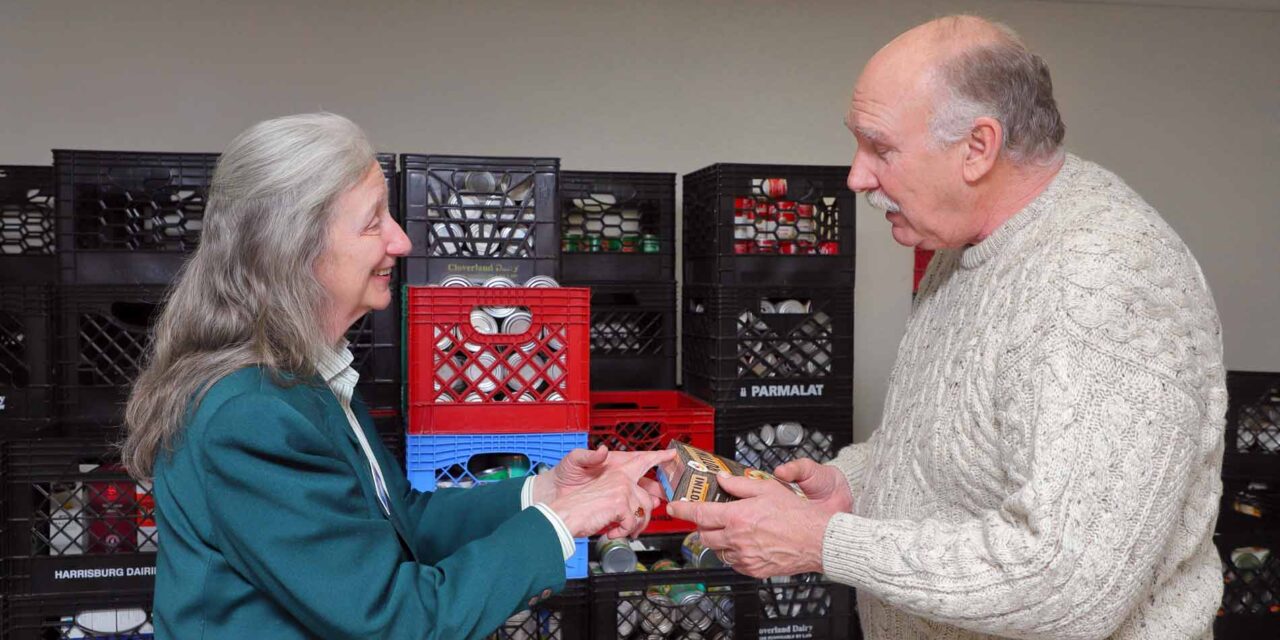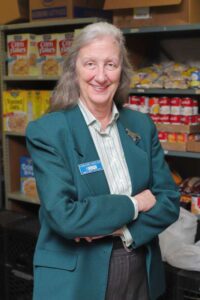Carroll County Food Sunday Executive Director Caroline Babylon with Food Administrator Mark Welch. (above)
Caroline Babylon, Executive Director, Carroll County Food Sunday: Finding Inspiration in
Our Local Community
by Kym Byrnes, photography by Nikola Tzenov
Caroline Babylon has lived in Westminster most of her life and has her hands in everything from serving as treasurer for multiple nonprofits to sitting on several boards to volunteering, and most recently taking on the role of executive director of Carroll County Food Sunday. She is married to Kevin Dayhoff, who has served as both a Common Council member and mayor of Westminster. If there is anyone who knows everyone, it just might be Caroline Babylon. A graduate of Westminster High School and Western Maryland College (now McDaniel College), Babylon’s professional career was spent as a bank examiner. Babylon says her parents were active and engaged in the community when she was growing up, and she is just following in their footsteps. She finds inspiration in seeing people benefit from projects she’s had a hand in.
Carroll County Food Sunday
“To know hunger exists and to do nothing is the shame and bane of human life.”
— Dominic Jollie
Dominic Jollie launched Carroll County Food Sunday in 1982. According to the organization’s website, Jollie encouraged the local religious community to collect food at their Sunday services for distribution through a countywide food bank network that was appropriately incorporated as “Food Sunday.”
CCFS distributes a weekly grocery package that is based on household size and is meant to last three or four days. It includes meat, eggs, fruits, vegetables, breads and milk. More than 400 families a week are served at
three locations — Westminster, Eldersburg and Taneytown.
About half of the food comes from the Maryland Food Bank, while the other half is supplied by donations from individuals, churches and food drives.
To receive services, or to donate or volunteer, visit CCFoodSunday.org.
What is it about Carroll County that has kept you here all these years?
Family, and love of the community I grew up in.
What are some of the local activities and initiatives you are involved in?
I’m a volunteer instructor and the treasurer for 4-H therapeutic riding, and because of that commitment, I’m also on the board of the Ag Center. I’m a member and the treasurer for the Westminster Fire Company, I’m on the board and the treasurer of the Community Foundation of Carroll County, and I’m active at Grace Lutheran Church. Oh, and I play the bassoon for the Westminster Municipal Band.
What motivates you to give time, to give of yourself?
Some of it is heritage. I learned it from my mother and father — they were always giving back to the community. My dad was an accountant and my mom worked in his office and did income taxes. He was in the Lions Club and on city council and she’s still active in the Woman’s Club. She was active at the hospital when it first opened, and she was the first woman president of the church council at Grace Lutheran. Aside from learning from my parents, I’m motivated by the successes, seeing things happen, seeing people benefit from the things I’ve helped make happen.
How did you initially get involved with Carroll County Food Sunday?
I first got involved in April 2020. Food Sunday couldn’t distribute its usual way because of the pandemic so it moved to Grace Lutheran Church and set up a drive-through for food distribution. At that point, I was looking to retire from banking and the executive director position was open. It’s part time and pays a stipend — it fit what I was looking for.
What about this position interested you?
Knowing it was already such a well-run organization and it does such wonderful work around the county. It’s a nice opportunity to continue on and build on success.
You’ve been there a year. Anything about the position or organization that surprised you?
Learning the complexities and intricacies of food distribution throughout the county — a soup kitchen is different than a food bank which is different than a food pantry, etc. It was interesting to see those complexities and how they all work together.
Do you have any insights on how the pandemic has changed food needs in Carroll County?
I think the pandemic has changed the landscape. Distributors had to be creative to account for social distancing. Federal and state programs increased support during the pandemic and I think that made a difference in the level of need we were seeing. Knowing that, it begs the question what will happen when some of that federal and state support drops off again.
As far as donations, community support increased exponentially during the pandemic. Financial and food donations have been incredible in the last two years, and that has made our job easier because we can get what we think our clients need and be able to distribute at all three sites.
Who are the people who use Food Sunday services?
Most of our clients are blue-collar folks who are able to cook and probably have a job of some sort, but just need the extra help. They’ll use the food that we have first in budgeting and then they know what else they need to get to supplement that week’s food. They can come in once a week, they’ll use us as their first shop and then go get what they want. We have few truly homeless clients that come in — they typically go to soup kitchens because the food is already prepared. We do keep a supply for noncookers who might be homeless or living in a hotel — food that doesn’t need to be cooked.
Can you put the need into perspective?
Approximately 10,765 households visited Carroll County Food Sunday in 2021. We moved 86 tons of food last year. We also have a base of about 70 volunteers.

“At the end of the day, I’m happy to see that we served lots of people and gave out lots of food. The other real joy is seeing the donations that come in through the warehouse — the community is so supportive.”
– Caroline Babylon
What do you love about the job?
At the end of the day, I’m happy to see that we served lots of people and gave out lots of food. The other real joy is seeing the donations that come in through the warehouse — the community is so supportive. The other joy is volunteers. We have a wonderful volunteer base and they really connect with and care about the clients. I love seeing those relationships.
What are the challenges that come with the job?
The biggest challenge this year has been finding a new food bank administrator. Dennis Fahey has been our food administrator for 20 years, and trying to find a replacement for his dedication and extreme knowledge was really a focus of last year. We now have Mark Welch working as our food administrator and we’re excited about having him come online to his new retirement job.
What do you do when you’re not working?
Volunteering at other nonprofits, and my biggest love is therapeutic riding. I’ve also got a lot of family I try to spend time with.
What else do you want people to know?
This year marks Food Sunday’s 40th year of operation, and we will be celebrating appropriately later in the year. To have an organization whose mission is to give away things that has lasted this long in the community and has such wonderful support through donations and volunteers is pretty incredible — it speaks well for the community and is pretty significant.


